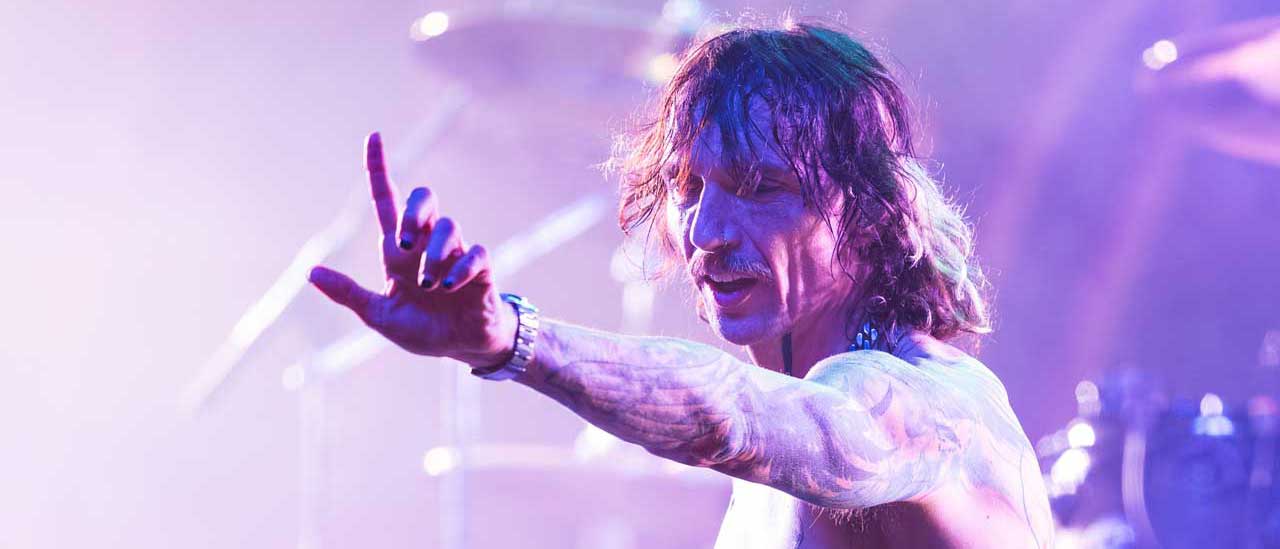Joe Bonamassa: A life in bulletpoints
Joe Bonamassa was discovered as a kid, mentored by the greats – and screwed by the music biz. Then he got his revenge…

Select the newsletters you’d like to receive. Then, add your email to sign up.
You are now subscribed
Your newsletter sign-up was successful
Want to add more newsletters?

Every Friday
Louder
Louder’s weekly newsletter is jam-packed with the team’s personal highlights from the last seven days, including features, breaking news, reviews and tons of juicy exclusives from the world of alternative music.

Every Friday
Classic Rock
The Classic Rock newsletter is an essential read for the discerning rock fan. Every week we bring you the news, reviews and the very best features and interviews from our extensive archive. Written by rock fans for rock fans.

Every Friday
Metal Hammer
For the last four decades Metal Hammer has been the world’s greatest metal magazine. Created by metalheads for metalheads, ‘Hammer takes you behind the scenes, closer to the action, and nearer to the bands that you love the most.

Every Friday
Prog
The Prog newsletter brings you the very best of Prog Magazine and our website, every Friday. We'll deliver you the very latest news from the Prog universe, informative features and archive material from Prog’s impressive vault.
Who is Joe Bonamassa? A couple of years ago he summed himself up with the words, “I collect guitars, I work a lot and I read about politics and world events.” Is that still an accurate description?
“Yep, that pretty much sums me up,” he says. “I try to be informed. I don’t want to be the musician that’s like [thick muso voice], ‘I dunno maaaan, I just plug in and play.’ There’s nothing worse than a dumb musician and nothing worse than a musician who’s smart but acts dumb just because that’s what you’re supposed to do.”
You must have some other interests. Do you watch movies? “Not really. After an hour I get antsy.” He describes sitting at home in front of a movie with a guitar in hand, half playing, half watching. “When I’m by myself that’s not a problem, but when you’re with a girl, she’s like, ‘Come on now.’”
What about books? Do you read?
“I don’t,” he says. “I have a very short attention span. Books are tough. I like bullet points.”
So you’re not gonna read this story when it’s published?
“I will,” he says, laughing. “Word for word.”
Sign up below to get the latest from Classic Rock, plus exclusive special offers, direct to your inbox!
Yeah, right. We don’t believe him. So here, for your delectation – and possibly his, if he can put his guitar down for a minute – is Joe Bonamassa. In bullet points…

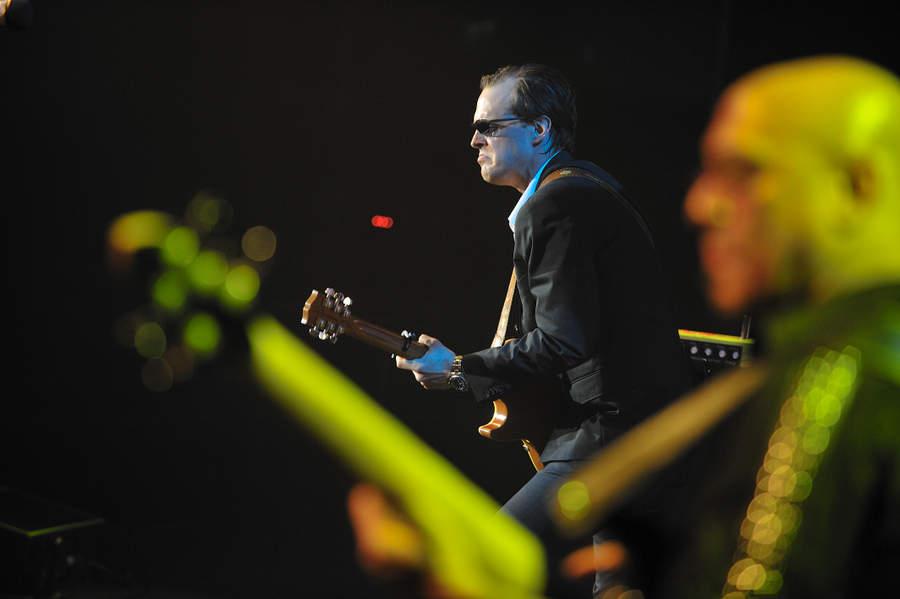
- You think you’ve had a busy year? Joe Bonamassa’s week beats your year
In 2011, Joe released more albums in 12 months than Metallica have in a decade. Here’s what 2012 looks like for Joe:
January: He has the month off, the lazy bastard.
February: Finishes next solo album, to be released in May. Goes on tour in Europe.
March: Touring Europe for the whole month. Release of Joe Bonamassa Live At The Beacon DVD, recorded at the New York Theatre in November.
April: On a major US tour until May 25.
Summer: Back in the studio to record Black Country Communion 3. Followed by “two weeks off” in which he’s doing an acoustic album and DVD – live and acoustic at the Vienna Opera House. “Then we may do some Beth Hart stuff. Then we may take the rest of the summer off.”
August: Back in the studio with Kevin Shirley for the next solo album.
September: Tour of Asia. “We’ve been to Singapore, Macaw, Hong Kong, Japan,” says his manager Roy Weisman, “and now we’re gonna add Manila, Kuala Lumpur, Thailand.”
October: Australia and New Zealand.
November: “And when we come back,” says Weisman, “I just confirmed his entire tour for the Fall in the United States – the coolest theatres in America in that 2,500-3,000 seat range.”
(For comparison, this is what Metallica’s schedule looks like:
January: Hope everyone’s forgotten about Lulu.
February-May: As above.
June: Play Black Album at Download festival. Hope everyone’s forgotten about Lulu.
Rest of year: Uhhhhhhhhhhhhhhh…)

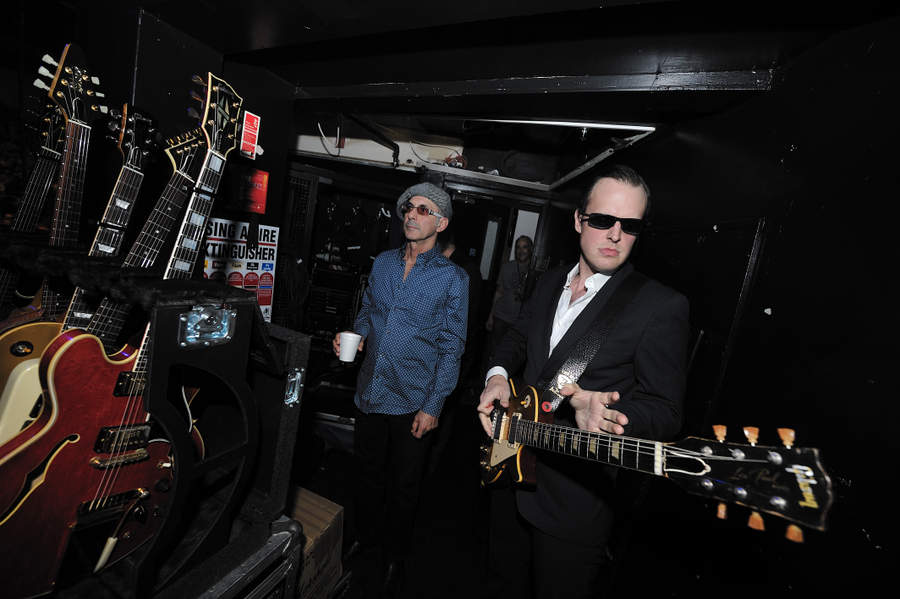
- The hardest part of Bonamassa’s life is when he stops working
“The hardest part is coming off the road,” he says. “The first three or four days, the silence is suffocating. On a big tour, you’re surrounded by 18, 19 people that you see every day. There’s always something moving, whether it’s a truck or a kick drum or a bag. Then you go home and you sit there in your flat and – I’m a big news buff so I put on my favourite news channels – and I sit there and I go back and forth with my guitar and you hear the clock going: Tick. Tick. Tick. And it’s like hitting a brick wall – boom. That’s an adjustment.”

- Joe Bonamassa drinks 12 cans of Diet Coke a day
Can you tell the difference between Coke and Pepsi?
“Yes, blindfolded,” he says without a second’s hesitation. “I could tell you the difference between Diet Coke made in Britain and Diet Coke made in the US. When you drink 12 of them a day you become like a Coke-aholic.”

- Joe Bonamassa is a phenomenon not easily explained.
He has just played a sold-out British tour, playing to 2,500+ audiences a night in towns like Blackpool, Cardiff and Plymouth, and yet:
- He’s never had a hit
- He's never been on the cover of a mainstream magazine
- He has rarely been played on the radio outside of Paul Jones’s blues show on Radio 2 or Planet Rock.
Despite this, his last two albums made the UK Top 20. His success, and the methods behind it, could become a template to copy in a music business struggling to cope with the collapse of old business models.

- Joe is partners with his manager Roy in J&R Adventures
J&R owns Joe’s music, publishes Joe’s music, promotes Joe’s gigs, makes Joe’s t-shirts, runs Joe’s website.
“The two of us have committed to this vision,” says Roy, “of shoving it up the music industry’s ass and fucking showing everybody that they were wrong.
“We don’t fuck around,” he says. “I’ve never lost momentum. Momentum is everything in life, doncha think? I’ve worked 20 years to get the momentum on my side.
“Are we gonna be millionaires? Yeah – we’re gonna be really rich. I worked 20 years for this. I was really poor for 20 years, but Joe and I are gonna be really fucking rich. We’re talking tens of millions, each. And I’m talking about playing 2,500 seats a night for those numbers to be realised. We don’t have to be this fuckin’ arena act to be that rich. I’m very proud of that – I was broke for 18 years, dude.”
Roy’s dad was manager of Frank Sinatra in his later years and executor of his estate when Frank died.
“I grew up on the side of the stage watching Frank Sinatra,” says Roy. “I flew in a plane with him, I slept at his house. I travelled with dad from the age of 13 onwards with his acts – from Liza Minnelli to Paul Anka to Sammy Davis and Frank Sinatra – every one of those fucking people have the same quality that Joe has. The stars are the stars.”
The story of Joe Bonamassa is also the story of J&R Adventures. It’s the story of how two people took on the music business – the record companies, the agents and the promoters – and won. It’s the story of a guy who understood the business of music from an early age (Roy), and a guy who understood music itself (Joe). And it’s a story that starts in the late 80s.

- While most 15-year-olds hate their parents’ music, Joe fell in love with his
So what did his parents do right?
“Every Saturday, my father used to come to me and say, ‘Hey, let’s listen to some records.’ So any given Saturday, there would be the Jeff Beck Group’s Truth playing, or – I call it the ‘orange record’ [1972’s Jeff Beck Group] – the one with Bobby Tench and Max Middleton and Clive Chaman, the Rough And Ready band with Cozy Powell.
“Another Saturday it’d be Yessongs in its entirety or Thick As A Brick by Jethro Tull. We’d sit and listen and my father is a good commentator. Think of him as Jackie Stewart watching F-1. He’d take the needle off and say, ‘Listen to this part.’ And he’d play me the bass part and give me appreciation for not just the guitar-playing, but Rick Wakeman and Bill Bruford and Chris Squire – who’s actually become a really good friend and is one of my favourite bass players of all time.
“So it was fun, cos the guitars would come out and you’d just get immersed in this world of discovery and music and guitar playing and before you knew it you’d killed a Saturday without even thinking about it. We listened to everything from Robben Ford, to the various incarnations of Clapton’s solo band – the stuff from the 70s, Behind The Sun, the Beano album. It was really soup to nuts. So much so that still to this day I still don’t really know what is on the radio. I’ve always detached myself from popular music.”

- Every time anyone buys something from Joe’s website, Roy gets a text message
We sit with him in the back of a London cab as text messages arrive:
- A CD ordered from Holland
- A T-shirt from Brighton
- A DVD from Sweden
Surely he doesn’t need all that coming to his phone every day? “Are you kidding me?” he says. “This is what gets me outta bed in the morning!”

- Joe and Roy have a thing they call The Book Of Joe.
The Book Of Joe is not an actual book, at least not yet. But it’s a metaphorical way of talking about The Bonamassa Story and “all those moments and the critical people that made a difference in Joe’s career”. All those moments and people are logged and debts remembered. People who have a special place in The Book Of Joe’s early chapters include:
- Danny Gatton: a legend in guitar-playing circles, the late Danny Gatton was a jazz/rockabilly/fusion guitar ace who tutored Joe when he was 11.
- BB King: Joe supported ‘The King of the Blues’, aged 12. BB’s subsequent comments (“This kid’s potential is unbelievable. He hasn’t even begun to scratch the surface. He’s one of a kind”) became a powerful endorsement that opened doors.

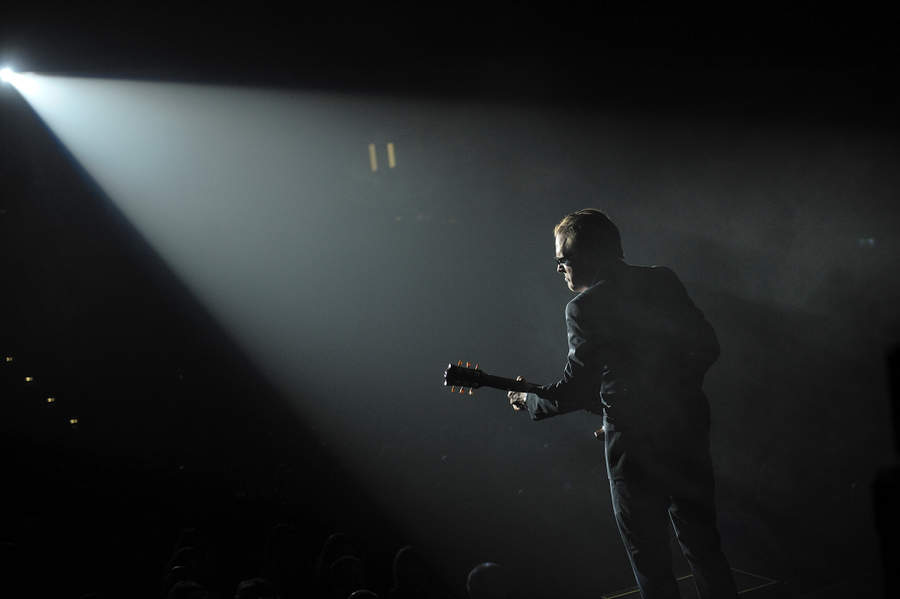
- Age 14, Joe’s first signed band was called Bloodline
Schooled by his dad, tutored by Danny Gatton, playing live with Gatton and BB King, Bonamassa built up enough of a reputation that he was offered the job as guitar player in Bloodline, a blues rock band made up of the sons of famous musicians.
Their drummer was Erin Davis, son of Miles Davis. On rhythm guitar was Waylon Krieger, son of Door Robby Krieger. On bass and vocals was Berry Oakley, Jr. (son of the Allman Brothers’ Berry Oakley). Bonamassa was the only one without famous parents (though Allmusic’s review of the time noted, ‘Joe Bonamassa may not be the progeny of a legend, but he is certainly the prodigy of this group’).
Bloodline released one album before splitting in 1995. Roy Weisman was Bloodline’s manager. He remembers calling Smokin’ Joe to tell him: “Bloodline is breaking up. They wanna do other things without you. You know what? Screw them. I’m staying with you. You wanna do jazz, do jazz. You wanna do fusion, do fusion.”
Joe is 18 by now, just graduating high school (although he has barely been at school, having spent his last few years on the road, with two months of ‘home schooling’ squeezing in a whole year of school work). He sends Roy a tape two weeks later, with a note that says, ‘I’m ready. And you know what, here’s me trying to sing. Sorry. Hope it’s not too bad.’
“I put it in the tape player,” says Roy, “and… it pretty much sucked. But every now and then there was a vocal moment that was great. And I thought, ‘Wow: if he could sing the whole song like that, it would work!’ I knew at that moment that I was committed to Joe Bonamassa until I die.”

- Little known Joey Bones Fact #1: he almost joined UFO.
This is so little known that even Joe doesn’t know it.
Back in September or October 1996, Joe was invited to Columbus, Ohio to rehearse with UFO. In Joe’s head he was just “filling in on guitar to help audition drummers or something”.
The drummer that day, Jerry Shirley, remembers things differently: “Pete [Way, bass] needed a drummer to audition this hot young guitar player to see if he was right for UFO,” says Jerry. “I was living in Cleveland working for this radio station 98.5 WNCX Cleveland. I thought Joe was brilliant. I was still running a version of Humble Pie and if we hadn’t had such a great lead player at the time I would have probably tried to pinch him…”
Joe turned up with a Flying V having learned Lights Out and a handful of other tracks. At the end of the first day, Pete Way changed his life. “Pete turns to me and he says, ‘Have you ever heard of a guitar player called Paul Kossoff? Your vibrato reminds me a lot of him.’”
Joe had heard All Right Now and thought it was Bad Company, so Pete made him a Free mixtape and on the trip home, with his dad driving, Joe stuck it in the cassette deck. “The first song was I’m A Mover – and it was everything I ever wanted to hear on a record. That simple, almost marching, British beat – very 2 and 4 – with space that you could drive a truck through. Simon [Kirke] wasn’t filling through every bar like a Mitch Mitchell. Ultimately it changed my life. It was just everything that I always wanted to be when I grew up and I said, ‘There ya go. That’s all it is for me.’”
(UFO didn’t release an album for another four years. When they did, Michael Schenker was back on guitar.)

- Also named in The Book Of Joe (Chapter 2):
- Phil Ramone: the legendary producer (Paul Simon, Billy Joel, etc) spotted something in Joe from an early age and, after the collapse of Bloodline, became the first person to offer him a record deal. Sadly, in what would become typical of Bonamassa’s experience of record companies, the deal went tits-up: two weeks before he was due to go in the studio, the record company closed.
- Michael Caplan: Caplan was one of the few major-label men to ever notice Bonamassa’s potential, signing him to Epic records and pairing him up with…
- Tom Dowd: the legendary Atlantic record producer who produced Bonamassa’s first album. Dowd was then in his 70s. “But as old as he was, he was young,” says Weisman. “And as young as Joe was, he was old. Those guys were like two peas in a pod.”

- By 1999 Bonamassa had learned to sing, got himself a major label and had one of the all-time great producers as a mentor
He’s in the studio with Tom Dowd making demos for Sony. “I didn’t have any experience of singing in the studio,” says Joe, “I’m just shouting in key. But Tom’s very good. And I spent almost two years with him putting songs together. The two months that we did the record was like a four-year Masters degree in music, recording, history – and how to be when you’re that accomplished.
“We’d get a lot of studio engineers coming in. They didn’t give a shit about me – they all wanted to meet Tom. They’d be asking him about Otis Blue or the Cream sessions, Derek And The Dominoes or Aretha Franklin. And Tom would say to them: ‘You know how you record Aretha Franklin? Here’s the secret. Put a microphone in front of her. She does the rest.’”
The album A New Day Yesterday was the last album Dowd ever finished. He died in 2002 from emphysema. “He was like a family member by the end,” says Joe. “And I miss him dearly and one day, when we have free time, I wanna go back and mix A New Day Yesterday and I’d like to re-sing it and dedicate it to him. Because I feel now, at 34 years old, that I’m just ready to work with someone of that calibre…”
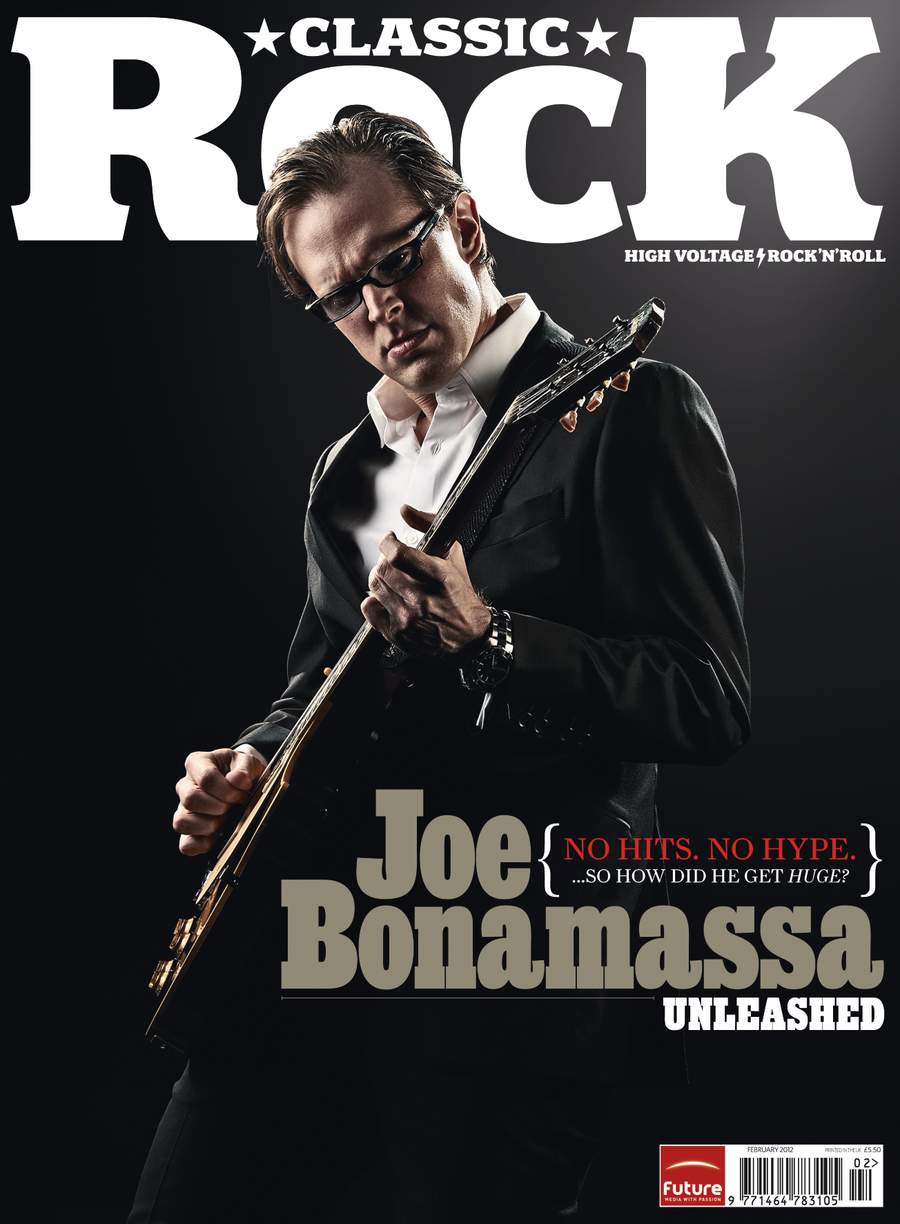

- The birth of J&R Adventures
Their plans had been scuppered by other musicians in Bloodline, and then screwed by the business operations of two different record companies. So Joe and Roy decided to do things for themselves.
“We started putting out Joe Bonamassa records under J&R Adventures from that point onwards,” says Roy. “By this point I was 33 and I knew enough to know that it wasn’t rocket science. We could go in to this little world called blues that the record companies didn’t give a shit about and we could be a big fish in a small pond.”
They built their company on a few staunch principles:
1. No one tells them what records to make. “I realised that we were never gonna get on radio,” says Roy, “so fuck the idea of making a record to get airplay. Never have I asked Joe to make a record for that reason. As a matter of fact, I said, ‘Here’s the deal: you make the records, and I’ll market them. Nobody tells you how to make your records.’ And no one’s told him how to make a record since. He makes his own records. I don’t hear the records until they’re virtually done. There’s no A&R man, just him and Kevin Shirley. No one asks to hear a fuckin’ song until it’s done. We call it church and state. He’s the church and I’m the state. He doesn’t fuck with this and I don’t fuck with that – it’s a perfect marriage.”
2. They are partners in everything. They reinvested everything they made back into J&R. They’re in it together. What’s good for Joe is good for Roy, and vice-versa. “We can have a board meeting for our company and there’s just the two of us,” says Joe. “It’s efficient. Record companies became so large they were like cruise ships on a Formula-1 track. Sometimes you need to make a decision like, ‘Hey, we’re supposed to be in Berlin, but there’s something we gotta do in Hamburg, can we re-route everybody?’ With a record company it would take a board meeting and you’d never get it done.”
3. They are an holistic enterprise: every part of the operation benefits the others. By taking on every aspect of Bonamassa’s business, they are strong in a way that the separate fields of record company, merchandiser, promoter and agent are not. “I understood early on that the record industry is not the concert or performance industry,” says Roy, “they’re actually completely apart. They don’t work together. They have separate agendas and I realised that what we were doing was outside the scope of what they could understand in this day and age and I said, ‘Fuck it, I’m gonna show them.’”

- Also named in The Book Of Joe (Chapter 3):
- George Thorogood: The blues-rock good-guy gave Bonamassa many support slots and along the way, says Joe, “He taught me how to tour.”
- Jethro Tull: “My first tour on A New Day Yesterday [named after and featuring the Tull song of the same name], was with Jethro Tull. Ian [Anderson] would come out every night and help sort out the sound. I mean, we were three guys in a van – he didn’t have to do that.”
- Carmine Rojas: Bonamassa bassist and band leader since 2006. Carmine played for David Bowie and Rod Stewart and was once part of a crew of session musicians that would be called in to secretly fix other people’s records when the act couldn’t nail it. He once ‘fixed’ someone’s record so well that their bassist later won ‘Bass Player Of The Year’ in some musician’s mag.
- Kevin Shirley: Producer of all Joe’s music since 2006. Back then, after a series of competent-but-unremarkable albums including 2003’s Blues Deluxe, Bonamassa was in danger of becoming ‘just another blues guitarist’, lost in a sea of Kenny Wayne Shepherds and Jeff Healeys. And then Shirley came along.
“I didn’t sell my soul for Jack’s three magic beans,” says Joe. “What I did do is find a producer in Kevin Shirley who consciously tried to airlift me out of the three-verses-and-a 20-minute-solo thing, and go ‘I’m gonna challenge you.’”

- We need to talk about Kevin
“I do the playing, Roy runs the business side and Kevin really is the third part,” says Bonamassa. “It’s hard to quantify the contributions of a guy like Kevin Shirley. When I first met him I was doing 200 or 300 – maybe 500 seats in Europe, tops. Tonight [in Plymouth] is the smallest English show at 2,500. And this is in seven years and seven albums. He stresses the songs, he stresses the creativity, he also stresses the performance of the band and having the right band. Not only is he one of my best friends in the world, he’s like a member of the family.
“Of all the people and producers that I’ve sat and talked with about music, the guy that I equate on an equal playing field with Tom Dowd is Kevin. As far as being a deep musical guy, being the best musician in the room, and also seeing the entire record before it’s done, that’s Kevin.”
“I first saw Joe at a small blues club in St. Charles, Illinois,” says Shirley. “There were 200 people there and I actually didn’t think someone who’s since become one of my best friends.”
You And Me earned Bonamassa a feature in Classic Rock in 2006 and two of its tracks, including an apocalyptic version of Zeppelin’s Tea For One, ended up on our free CDs that year. He was on the map.

- Little known Joey Bones Fact #2: He’s got some pair of balls.
Back in 2009, when he won the Breakthrough Award at the Classic Rock Roll Of Honour, Joe Bonmassa got on stage and played by himself in front of an audience that included Jeff Beck, Jimmy Page, Tony Iommi, Slash, Joe Perry, Pete Townshend, Brian May, Billy Gibbons and more. Afterwards, Doc McGhee said that Joe had “some pair of fuckin’ balls” to get up and play before that audience.
“I get a lot of credit for that gig,” laughs Joe. “But I didn’t know they were there! The only person I knew was there was Tony Iommi, who I have the utmost respect for as a guitar player, but I’m coming from a different genre, so I was like, ‘If he doesn’t get what I do, I get it.’ Because of where we were sitting I didn’t see Slash and Beck and Page and everybody. When Doc McGhee said that, I was like, ‘I’m glad I know this now…’ But if I’d known before?”
He shakes his head.

- How he went from 'Slobamassa' to Joey Bones…
While Kevin Shirley gave his music a make-over, Joe’s image changed too. He got fat.
“He was a fat fucking slob,” says Weisman with characteristic honesty. “Joe has come to understand that image is really important. He works really hard at not eating.”
“I gained a bunch of weight moving to California,” says Joe. “I got fat on success. When I lived in New York I didn’t have any money for food so I didn’t eat. But then you start to have a hundred bucks in your pocket and you take a girl out for dinner and then, ‘Let’s have another one – I made some more money.’ So I ended up getting fat on the little success I had. I thought I was Mr Cool. I was playing blues. I was in a tour bus, didn’t have to drive so I could have a drink after the show, could eat whatever I wanted, I was carefree. But you can only blame the dry-cleaners for shrinking your stuff so many times before you have to look at yourself.”
As he piled on the pounds, he also took to the stage in the same clothes he wore during the day. “I’d go out in the same jeans and whatever shoes I was wearing and a collared shirt, the buttons like lethal weapons, hanging on for dear life, titanium thread…”
And so, Joe ballooned into Slobamassa, until Kevin Shirley came to see him at a big moment in his career: his first time headlining a House Of Blues. “He was overweight, which didn’t bother me,” says Shirley, “but he was dressed in baggy jeans, a dirty plaid shirt, baseball cap and sneakers. Basically what he had been wearing all day, except for the little wraparound sunglasses he wears at the gig.
“I sent him an email saying, ‘Joe, you look like a slob!’ I said that if he wanted to be a blues artist, he should respect the genre – that BB King, and Albert and Freddie King – Muddy Waters and even Howlin’ Wolf and SRV – always looked like they dressed to impress…”
“I took offence,” says Joe. “I go, ‘Kevin, I spent good money on that shirt – it’s Hugo Boss!’ He says, ‘I don’t care – it looks like shit!’ Then I got really sick doing a tour here in the UK in early 2008…”
He lost 20 pounds in three weeks, bought a nice suit for a gig in Paris and when he saw pictures later, realised that he was on to something. Now he’s suited and booted for every gig.
“TK Maxx is your friend,” he says. “There’s a side of you that thinks, ‘Who do you think you are?’ But you look at pictures of Muddy Waters in the 60s and those guys were styled. I always said, I have to be dressed better than the people who come to see me.
“Some bands, that’s their thing. I don’t think Wilco would go down as well if they all shaved and wore tuxedos. Jeff Tweedy – he is that cat with the jean coat and the stubble. He wears it on stage and he wears it off stage and that’s who he is. For me, that’s really who I am on stage – I like a show to be a big event.”

- The Roy Weisman Guide to why promoters, record companies and agents are “fucking idiots”:
In Britain, J&R Adventures use a promoter (the Gig Cartel) and agent Neil O’Brien (“I call him an entrepreneurial agent and I separate him from the pack,” says Roy). But in much of Europe and the entire United States they don’t. Why?
“The marketplace dictates that typically an artist like Joe would end up playing blues clubs and festivals where tickets are 50 per cent or less of what mainstream ticket prices would be. So I decided we had to take control of that.”
What Roy did was to tell promoters that he wanted to charge $40 a ticket, instead of $18. When promoters huffed and puffed that “no one pays that for blues acts”, Roy said: “Fuck you. This is the Rolls-Royce of blues acts.” And then he hired the halls himself and charged $40. He took his fate into his own hands and the job of manager, agent and promoter folded into one.
“Why should Coldplay be able to go in and get the top ticket price but Joe Bonamassa can’t?” he says. “Why? Who says? I say bullshit and I’m going to fucking show why that’s not true. The promoters don’t get it – and the reason is that they don’t smell it, they sell it.”
But aren’t the promoters supposed to be the experts on how many tickets an act can sell? “They’re not experts,” spits Roy, “they’re full of shit. They know the obvious. To me, promoters are picking stocks based on yesterday’s news. And that’s why you hear that classic fuckin’ story: ‘Oh man, on X, Y & Z’s show, I just lost a fortune – I paid ’em top dollar and the last tour was great and then – boom.’ He’s lost half a million.
"Same with the agencies. I feel bad for any act that’s with a booking agency, I really do. Because they get nothing for paying 10 per cent. Fucking nothing. Most managers have no clue about what the fuck they’re doing either. I mean, you wanna talk about it? I don’t care.
"I’m an independent island – they can all fuck off, every one of them. Because the truth of the matter is that I rent every theatre myself. So Live Nation is gonna stop me? I don’t need an agent because I rent every theatre myself. I put out my own records, so is Sony gonna stop me? I mean, they’re fucking idiots, every one of them.”

- How Joe survives his touring regime:
“Imagine you took your entire house every day, put everything you own on wheels, packed it up, put it on a truck, went 200 miles down the road, unpacked, lived in it for a day, and then packed it all up and did it again. That’s essentially what it is. If you make it easy on yourself then the burnout is less. I mean, we go out for dinner on our days off, but nobody’s out ’til 2 o’clock in the morning. At least, none of the band, I dunno about the crew. There’s no way you can sustain a career, year after year, if you’re like, ‘I’ll take the whiskey flight!’
“We’ll have a bit of wine at the end of the gig, and have a laugh. It’s not like we’re passing round echinacea shots and showing each other yoga moves, but there’s no drugs out here, none of that clichéd burn-out stuff, cos I could see very quickly what that’d do. And what’s the top price here tonight, £50? Those people deserve the best show, at least the same show the guys in Cardiff got. So if we’d gone out last night and fell asleep on Plymouth rock… It’s bad for the show.”

- Three albums in 2011. Three or four in 2012. Doesn’t Joe Bonamassa put out too much material?
“Joe’s put out an album a year, virtually – every 12-15 months – since we left Sony. People have said to me along the way, ‘Don’t you guys put out too much material? Don’t you want to leave more time for that one to sell?’
"This is how we do it and why: if you can’t get airplay, your record is only current for about 10 seconds. You get press for 30-60 days, then it’s done. Then Joe would go to the clubs and do his thing. When you go back to the clubs a year later and you’ve got the same record out, what do the local free music papers have to write about? Nothing. And so they won’t cover you.
“So if you can’t get airplay to sustain a record for 24-36 months – which became the normal cycle in-between records, based on the recording industry’s point of view – you have to do something else.
"When you look at the old school, in the 60s and 70s, they used to pump out records by the month, twice a year if it was a hot artist, every year – but they wouldn’t wait ’til every three years. So the thought was, well, fuck it, if we can’t get radio we’ll keep putting out a new record a year so that I can keep having a new discussion with the media. By doing that, and keeping Joe on the road from year to year, that’s how we did this without having any radio, TV, or any major media working for us. How else could you do it?”

- So… who is Joe Bonamassa?
“At the end of the day,” he says, “my story is… Whatever people told you you had to be in order to get the key to the men’s club of rock’n’roll guitar, chances are there’s another way to do it. And chances are there is something that you’re missing.
"I can put it in terms of boxing. There are boxers that have a 57-0 record, make it look easy, knock everybody out. They’re mysterious, they’re feared and stuff like that. Then there’s cats that come up, get knocked out a couple of times, but knock some other people out, have a win record, but lose some here or there – they’re a people’s champion.
“My fans want to see me become successful, they make it a mission in their own personal lives. They take boxes of flyers and go out and put them on cars, y’know? And it’s because when you’re sick and it’s raining and it’s windy and it’s cold and you can’t be bothered and there’s five people outside the bus – you don’t walk past them. You get sick and you get rained on and you take the wind and you sign everything and you take pictures and you repeat that about 50,000 times – and that’s building your house.
“And you never take anybody for granted.”

Scott is the Content Director of Music at Future plc, responsible for the editorial strategy of online and print brands like Louder, Classic Rock, Metal Hammer, Prog, Guitarist, Guitar World, Guitar Player, Total Guitar etc. He was Editor in Chief of Classic Rock magazine for 10 years and Editor of Total Guitar for 4 years and has contributed to The Big Issue, Esquire and more. Scott wrote chapters for two of legendary sleeve designer Storm Thorgerson's books (For The Love Of Vinyl, 2009, and Gathering Storm, 2015). He regularly appears on Classic Rock’s podcast, The 20 Million Club, and was the writer/researcher on 2017’s Mick Ronson documentary Beside Bowie.

